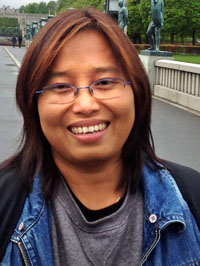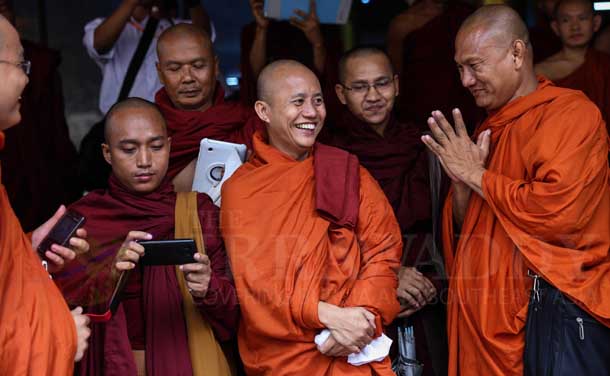In June of last year, a group of nationalist monks began lobbying for a new law to protect the national race and religion, Buddhism, with a focus on restricting interfaith marriages. They drafted a bill that called for restrictions on marriages between Buddhist women and men of other faiths, and they sent their proposal to lawmakers.
Women’s groups responded with a simple message: We said the bill was unacceptable because it was based on nationalistic and religious extremism, interfering with individual freedoms and particularly with the personal choices of women.
We also pointed out that the bill, if enacted, would suggest that Buddhism was so vulnerable as to require some form of protection. It would imply that the religion lacked the strength to stand while mingling with other faiths.
Over the past year, President Thein Sein has ordered government ministries and the High Court to draft official versions of not only the interfaith marriage bill, but also three other bills to restrict religious conversion, to enact population control measures and to outlaw polygamy. All of these are intended to protect race and religion.
It is high time for the people of Burma, regardless of ethnic background, faith or gender, to unite during the democratic reform process. That is why we women’s groups decided last month to issue a second statement against these divisive faith-based bills.
“We believe the current faith-based political activities, including arguments against interfaith marriage currently taking place in the country, are not in accordance with the objectives of the peaceful coexistence of all faiths and the prevention of extreme violence and conflict, but instead are ideas signed to distract the public before the 2015 election,” we wrote.

It seems that these bills are a ploy to delay the transition to democracy, the national peace process and constitutional amendments. From a gender perspective, it is also clear that supporters of the interfaith marriage bill view women as objectives. We cannot accept this irrational view, and we are not backing down from our campaign against it.
But we are facing a tough response from extreme nationalist groups. Civil society leaders and women’s rights activists who oppose these bills are now receiving abusive calls and online messages, including on Facebook and the phone application Viber.
I have personally been the recipient of scary phone messages since late last month. I have been called a “traitor of race and religion,” and I have received death threats. “Do you want to die, traitor?” one person asked. A blog, Myanmar Express, has meanwhile been personally attacking women activists who have spoken out against these bills.
As threats continue, the so-called reformist government remains silent. Rather than taking steps to ensure our safety, the minister of religious affairs has proposed to legally recognize the Association to Protect Race and Religion—known locally as Ma Ba Tha—as an official organization.
I am very upset about the actions taken by Thein Sein, who is lauded internationally as a reformist. He has opened his ears to extremist monks and pushed their agenda forward. Now the religious conversion bill, which seeks to prevent people from converting to a new faith without government permission, is about to hit the Parliament floor for discussion.
Last week, some representatives of civil society groups met with Parliament’s Rule of Law Committee, led by opposition leader Aung San Suu Kyi, to discuss our concerns about this bill. We frankly and freely offered our opinions.
The end result of our campaign will be determined by the leading decision-makers of the democratic transition—by officials in positions of power, including the president, ministers and parliamentarians, who will either accept or reject these bills. But no matter what, we will continue to fight for what we believe is right.
Zin Mar Aung is a human rights activist who co-founded the Rainfall Gender Studies group and won a 2012 International Women of Courage Award.

















